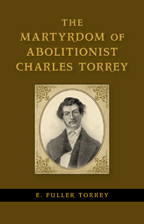During his brief yet remarkable career, abolitionist Charles Torrey—called the “father of the Underground Railroad” by his peers—assisted almost four hundred slaves in gaining their freedom. A Yale graduate and an ordained minister, Torrey set up a well-organized route for escaped slaves traveling from Washington and Baltimore to Philadelphia and Albany. Arrested in Baltimore in 1844 for his activities, Torrey spent two years in prison before he succumbed to tuberculosis. By then, other abolitionists widely recognized and celebrated Torrey’s exploits: running wagonloads of slaves northward in the night, dodging slave catchers and sheriffs, and involving members of Congress in his schemes. Nonetheless, the historiography of abolitionism has largely overlooked Torrey’s fascinating and compelling story.
The Martyrdom of Abolitionist Charles Torrey presents the first comprehensive biography of one of America’s most dedicated abolitionists. According to author E. Fuller Torrey, a distant relative, Charles Torrey pushed the abolitionist movement to become more political and active. He helped advance the faction that challenged the leadership of William Lloyd Garrison, provoking an irreversible schism in the movement and making Torrey and Garrison bitter enemies. Torrey played an important role in the formation of the Liberty Party and in the emergence of political abolitionism. Not satisfied with the slow pace of change, he also pioneered aggressive abolitionism by personally freeing slaves, likely liberating more than any other person. In doing so, he inspired many others, including John Brown, who cited Torrey as one of his role models.
E. Fuller Torrey’s study not only fills a substantial gap in the history of abolitionism but restores Charles Torrey to his rightful place as one of the most dedicated and significant abolitionists in American history.
E. Fuller Torrey, M.D., is the executive director of the Stanley Medical Research Institute and a professor of psychiatry at the Uniformed Services University of the Health Sciences. He is the author or coauthor of twenty books, including The Roots of Treason, which was honored by the National Book Critics Circle.
Praise for The Martyrdom of Abolitionist Charles Torrey
“The author . . . does a remarkable job of drawing his story from a combination of primary sources, such as personal letters and abolitionist newspapers, and secondary sources.”—Journal of Southern History
“History has waited far too long for a comprehensive biography of abolitionist Charles Torrey. . . . This book tells a good story and reflects solid historical research, convincing us of why Torrey deserves a seat among the giants in the history of the abolitionist struggle.”—Journal of the Early Republic
“A well-documented, engagingly written work that deserves attention from scholars, students, and the general public. . . . It is an excellent step in restoring to a place of significance in our memory an important figure in American abolitionism and an exemplar of antebellum interracial activism.”—Civil War Book Review
“The book ably reveals Torrey’s humanity, and his strengths and weaknesses during his eleven-year activist career. . . . Fuller Torrey weaves together well-selected primary and secondary sources to highlight a man willing to break the law and even court death for his convictions.”—Ohio Valley History
